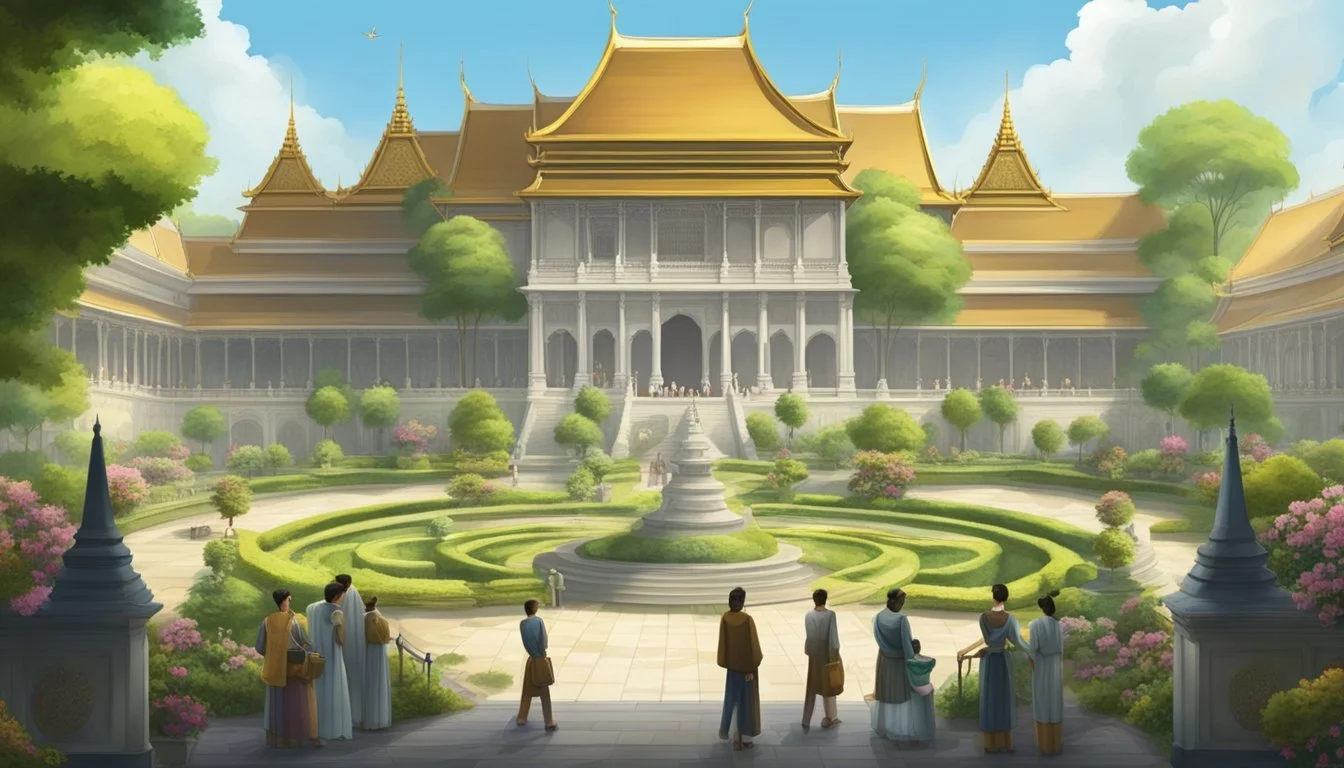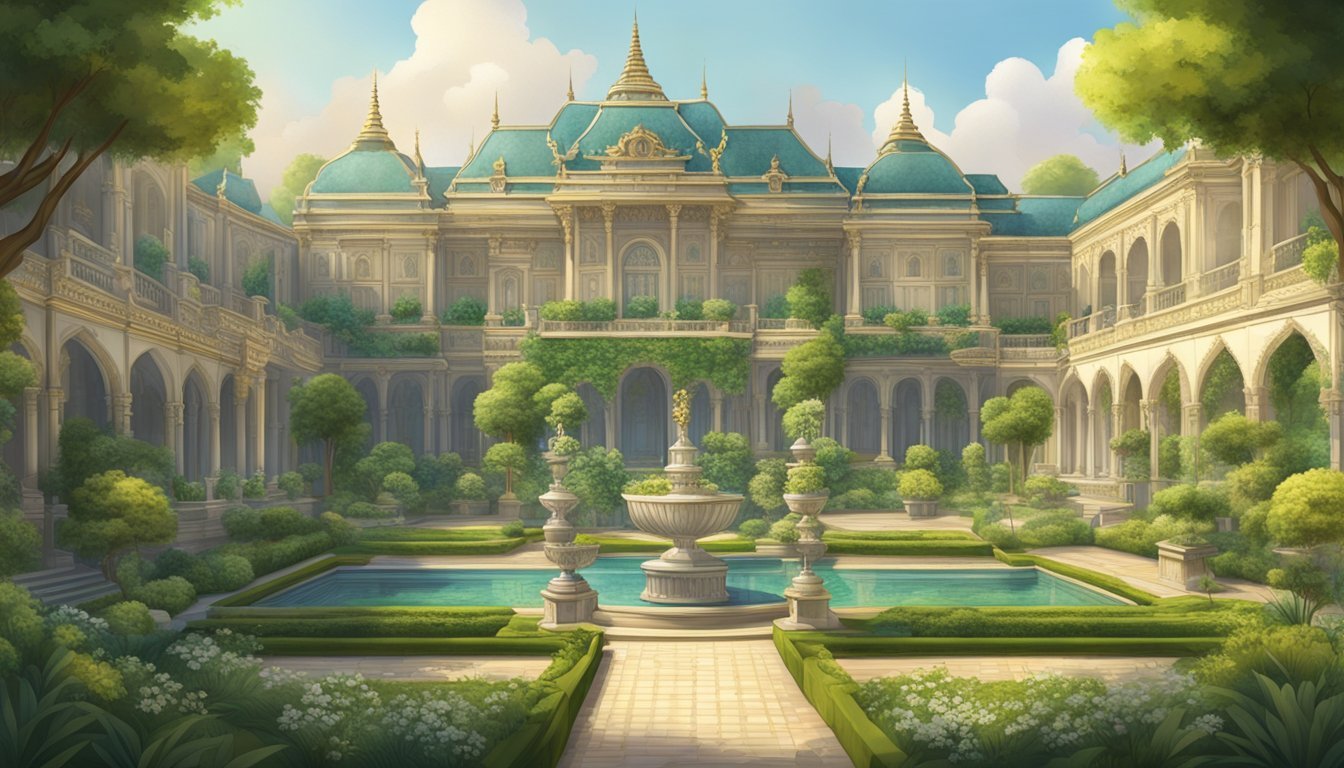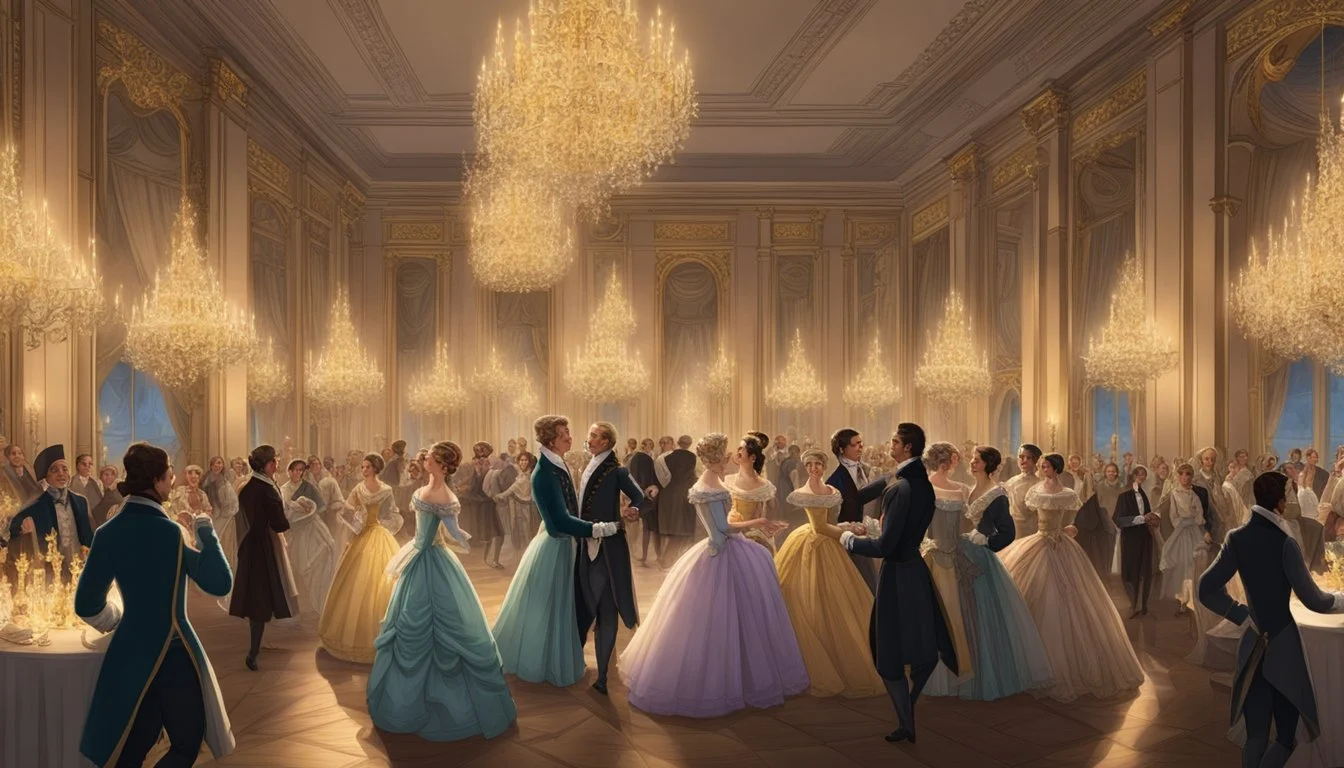8 Films on the Age of Absolutism in Europe
Cinematic Journeys Through Royal Power
The Age of Absolutism in European history was a period of centralized power and strong monarchies. From the 16th to the 18th centuries, rulers across the continent sought to consolidate their authority and create unified nation-states. This era saw the rise of powerful monarchs like Louis XIV of France, often referred to as the "Sun King," who embodied the principles of absolute rule.
Films set during the Age of Absolutism offer viewers a window into this fascinating period of European history. These movies bring to life the opulent courts, political intrigues, and societal changes that characterized the era. Through historical dramas and period pieces, audiences can gain insight into the lives of monarchs, nobles, and common people during this transformative time in Europe's past.
1) "The Rise of Louis XIV" by Roberto Rossellini
Roberto Rossellini's 1966 French television film "The Rise of Louis XIV" offers a compelling portrayal of the young monarch's ascent to power. The film, also known as "The Taking of Power by Louis XIV," was originally titled "La prise de pouvoir par Louis XIV" in French.
Set in 17th century France, the film chronicles Louis XIV's transformation from a young king to an absolute monarch. It focuses on the pivotal period following the death of Cardinal Mazarin, Louis's powerful advisor.
Rossellini employs a docudrama style to depict Louis XIV's strategic moves to consolidate his authority. The film showcases the king's calculated use of fashion, etiquette, and architecture to assert his dominance over the nobility.
Jean-Marie Patte delivers a nuanced performance as Louis XIV, capturing the king's growing confidence and political acumen. The film's attention to historical detail provides viewers with an immersive glimpse into life at the French court.
At 100 minutes long, "The Rise of Louis XIV" forms part of Rossellini's ambitious project to explore key moments in human progress through film. It offers a thought-provoking examination of the origins of absolutism in France.
2) "Queen Christina" directed by Rouben Mamoulian
"Queen Christina" is a 1933 biographical film that offers a fictionalized portrayal of the 17th-century Swedish monarch. Directed by Rouben Mamoulian for Metro-Goldwyn-Mayer, the film stars Greta Garbo in the titular role.
The movie presents Christina as a strong-willed and unconventional ruler who challenges the expectations of her court and country. It depicts her struggle between duty and personal desires, culminating in her decision to abdicate the throne.
Garbo's performance is widely praised as one of her most captivating. The film's final scene, featuring a close-up of Garbo's face, is considered iconic in cinema history.
While taking liberties with historical accuracy, "Queen Christina" explores themes of power, gender roles, and individual freedom against the backdrop of 17th-century European absolutism. The film portrays Christina's reign as a period of cultural flourishing and political maneuvering.
"Queen Christina" was both a critical and commercial success upon its release. It remains a significant work in the portrayal of historical monarchs on screen, blending elements of romance, drama, and political intrigue.
3) "Cromwell" starring Richard Harris
"Cromwell" is a 1970 historical drama directed by Ken Hughes. The film stars Richard Harris as Oliver Cromwell and Alec Guinness as King Charles I.
Set in 17th century England, the movie depicts the power struggle between Cromwell and the monarchy. It portrays Cromwell as an ambitious country gentleman who challenges political oppression and corruption.
The film features impressive battle scenes and castle shots, aiming to capture the epic scale of the English Civil War. However, some critics felt Hughes' direction didn't fully realize the potential of the material.
Richard Harris delivers a strong performance as Cromwell, portraying him sympathetically as a man driven by religious conviction and desire for parliamentary democracy. Alec Guinness counters with a nuanced portrayal of King Charles I.
"Cromwell" received mixed reviews but was praised for its production values and performances. It won an Academy Award for Best Costume Design.
The movie provides a dramatized look at a pivotal period in British history, exploring themes of power, religion, and political reform. While it takes some liberties with historical accuracy, it offers an engaging introduction to the conflicts of the era.
4) "Madame du Barry" by William Dieterle
William Dieterle's 1934 film "Madame du Barry" offers a glimpse into the opulent world of French absolutism. The movie portrays the life of Madame du Barry, the last mistress of King Louis XV.
Dolores del Rio stars as the titular character in this historical drama. The film depicts du Barry's rise from humble origins to become a powerful figure in the French court.
Set against the backdrop of 18th century Versailles, "Madame du Barry" showcases the lavish lifestyles of the aristocracy during the Age of Absolutism. It highlights the influence wielded by royal mistresses in the politics of the era.
The movie blends elements of comedy and drama to tell du Barry's story. It explores themes of power, ambition, and the excesses of the French monarchy in its twilight years.
"Madame du Barry" provides a Hollywood interpretation of European absolutism. While taking some liberties with historical accuracy, it offers viewers a vivid portrayal of life in the court of Louis XV.
5) "Barry Lyndon" directed by Stanley Kubrick
Stanley Kubrick's 1975 film "Barry Lyndon" is a masterful portrayal of 18th century European society during the Age of Absolutism. Based on William Makepeace Thackeray's novel, the film follows the rise and fall of an Irish opportunist in aristocratic circles.
Kubrick's meticulous attention to detail brings the era to life with stunning visuals and authentic costumes. The film's use of natural lighting, including scenes lit entirely by candlelight, creates a painterly aesthetic reminiscent of the period.
"Barry Lyndon" explores themes of social mobility, class structure, and the pursuit of power in absolutist Europe. Ryan O'Neal stars as the titular character, navigating a world of rigid hierarchies and political intrigue.
The film's deliberate pacing and three-hour runtime allow for a deep immersion into the customs and social norms of the time. Kubrick's signature detached style serves to highlight the often cold and calculated nature of aristocratic society.
While initially met with mixed reviews, "Barry Lyndon" has since gained recognition as a cinematic achievement. Its portrayal of 18th century European life offers viewers a window into the complexities of the Age of Absolutism.
6) "The Three Musketeers" directed by George Sidney
George Sidney's 1948 adaptation of "The Three Musketeers" brings Alexandre Dumas' classic novel to life in vibrant Technicolor. The film stars Gene Kelly as the dashing D'Artagnan and Lana Turner as the seductive Lady de Winter.
Set in 17th century France during the reign of Louis XIII, the movie captures the political intrigue and power struggles of the era. It depicts the conflict between the King and the ambitious Cardinal Richelieu, who seeks to usurp royal authority.
The film showcases the adventures of D'Artagnan and his Musketeer companions as they work to thwart Richelieu's plans. Their loyalty to the crown exemplifies the complex relationships between nobility, military, and monarchy in absolutist France.
With a budget of over $4 million, the production boasts lavish costumes and sets that recreate the opulence of the French court. The sword fights and action sequences, particularly those featuring Gene Kelly's acrobatic skills, add excitement to the historical drama.
While taking some liberties with Dumas' original story, the film provides an entertaining glimpse into the political machinations and social structures of pre-Revolutionary France. It illustrates the tensions between centralized power and those who sought to challenge it during the Age of Absolutism.
7) "A Royal Affair" directed by Nikolaj Arcel
"A Royal Affair" is a 2012 Danish historical drama film directed by Nikolaj Arcel. Set in 18th century Denmark, the film depicts a pivotal period during the reign of King Christian VII.
The story revolves around the relationship between Queen Caroline Mathilde and Johann Friedrich Struensee, the king's physician. It explores their secret romance and their efforts to bring Enlightenment reforms to Denmark.
Mads Mikkelsen portrays Struensee, while Alicia Vikander plays Queen Caroline. Mikkel Boe Følsgaard takes on the role of the mentally unstable King Christian VII.
The film delves into the political intrigue and power struggles at the Danish court. It showcases the clash between progressive ideals and traditional absolutism.
Arcel's direction brings to life the opulent yet restrictive world of 18th century European royalty. The film received critical acclaim for its performances, costume design, and historical authenticity.
"A Royal Affair" offers a compelling look at a lesser-known chapter of European history. It illustrates the personal and political challenges faced by those who sought to challenge absolute monarchical power.
8) "The Madness of King George" directed by Nicholas Hytner
"The Madness of King George" is a 1994 historical drama that explores the mental decline of King George III of England in the late 18th century. Directed by Nicholas Hytner, the film is based on Alan Bennett's stage play of the same name.
The movie stars Nigel Hawthorne as King George III, reprising his role from the original theater production. Helen Mirren portrays Queen Charlotte, while Rupert Graves plays Greville, one of the king's attendants.
Set in 1788, the film depicts King George III's deteriorating mental state and the political crisis it precipitates. As the monarch's behavior becomes increasingly erratic, his courtiers and family members struggle to manage the situation and its implications for the monarchy.
The film explores the limited understanding of mental illness during that era and the primitive treatments employed. It also delves into the power dynamics within the royal court and the attempts by some to take advantage of the king's condition.
"The Madness of King George" received critical acclaim for its performances, particularly Hawthorne's portrayal of the troubled monarch. The film offers a compelling glimpse into the personal and political challenges faced by an absolute monarch grappling with mental illness.
Historical Context of Absolutism
Absolutism emerged as a dominant political system in early modern Europe, characterized by monarchs wielding supreme authority. This period saw the consolidation of power in the hands of rulers who claimed divine right and sought to centralize control over their territories.
Origins of Absolute Monarchies
Absolute monarchies arose from the decline of feudalism in the late Middle Ages. The Hundred Years' War and the Black Death weakened the nobility, allowing monarchs to expand their influence.
The 16th century saw the rise of nation-states, with rulers like Henry VIII of England asserting greater control. In France, Louis XIV became the archetypal absolute monarch, declaring "L'état, c'est moi" ("I am the state").
Spain under Philip II and Prussia under Frederick William I also embraced absolutist principles. These rulers strengthened central bureaucracies and standing armies to enforce their will.
Key Features of Absolutist Rule
Absolute monarchs claimed divine right to rule, asserting God had chosen them to lead. This ideology justified their unchecked power and demanded unquestioning obedience from subjects.
Centralization was a hallmark of absolutism. Monarchs created elaborate court systems and bureaucracies to extend their reach. They also standardized laws and taxes across their realms.
Standing armies became crucial for absolutist rulers. These forces allowed monarchs to quell internal rebellions and wage wars of expansion. Taxation increased to support these military endeavors.
Absolutist rulers often embraced mercantilism, tightly controlling their economies to maximize state wealth and power. This policy led to the creation of colonial empires and trade monopolies.
Cultural and Artistic Reflections
The Age of Absolutism profoundly shaped European culture and arts. Royal patronage and centralized power fueled new artistic movements and philosophical ideas that reflected the era's grandeur and societal shifts.
Impact on Literature and Philosophy
Royal courts became centers of literary and philosophical activity. Writers and thinkers often produced works praising monarchs or exploring ideas of power and governance. Jean Racine wrote neoclassical tragedies performed at Louis XIV's court. Molière's comedies satirized aspects of French society.
Thomas Hobbes' "Leviathan" argued for strong central authority. John Locke's "Two Treatises of Government" challenged absolutism, influencing Enlightenment thought. The era saw a rise in political philosophy examining the nature of sovereignty and social contracts.
French became the language of diplomacy and high culture across Europe. This linguistic dominance reflected France's political and cultural power under absolutism.
Baroque Art and Architecture
Baroque art emerged as the dominant style, characterized by grandeur, drama, and emotional intensity. It served to glorify absolute monarchs and the Catholic Church. Caravaggio pioneered the use of dramatic lighting and realism in religious paintings.
Versailles palace epitomized Baroque architecture, projecting Louis XIV's power through its opulent design. Its Hall of Mirrors dazzled visitors with gilt and crystal, showcasing French craftsmanship and wealth.
Peter Paul Rubens created dynamic, colorful paintings for royal patrons across Europe. Diego Velázquez's portraits captured the Spanish court's power and mystique. Bernini's sculptures and fountains adorned Rome, blending classical forms with Baroque energy.





